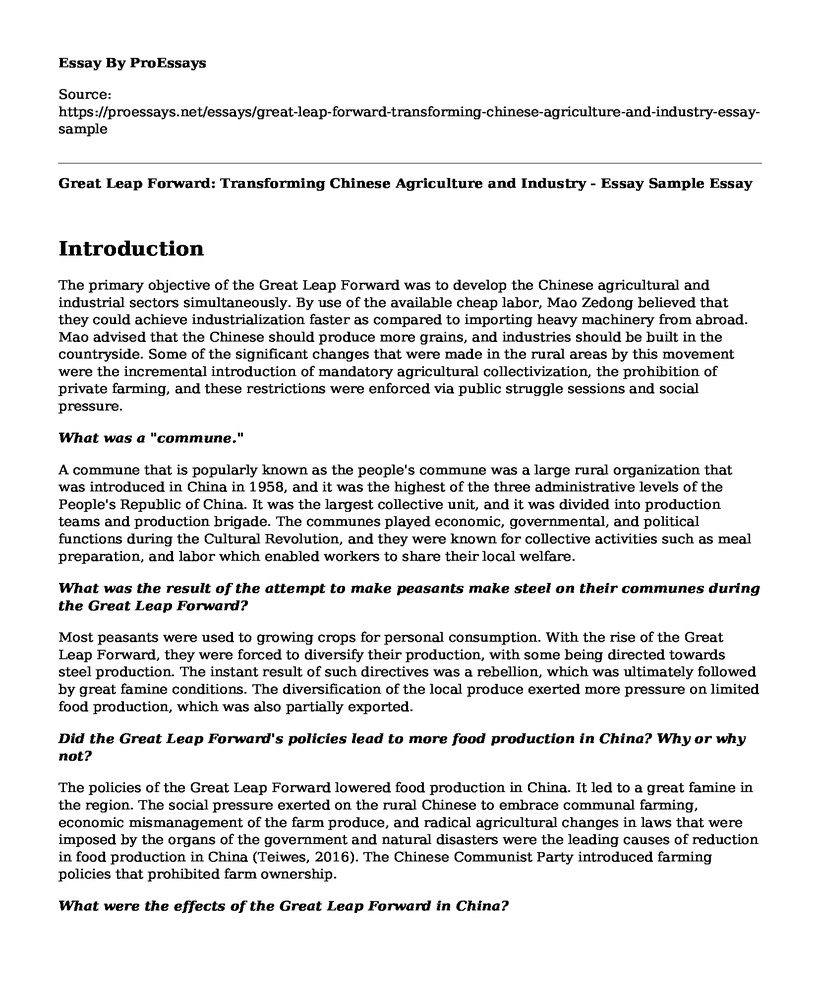Introduction
The primary objective of the Great Leap Forward was to develop the Chinese agricultural and industrial sectors simultaneously. By use of the available cheap labor, Mao Zedong believed that they could achieve industrialization faster as compared to importing heavy machinery from abroad. Mao advised that the Chinese should produce more grains, and industries should be built in the countryside. Some of the significant changes that were made in the rural areas by this movement were the incremental introduction of mandatory agricultural collectivization, the prohibition of private farming, and these restrictions were enforced via public struggle sessions and social pressure.
What was a "commune."
A commune that is popularly known as the people's commune was a large rural organization that was introduced in China in 1958, and it was the highest of the three administrative levels of the People's Republic of China. It was the largest collective unit, and it was divided into production teams and production brigade. The communes played economic, governmental, and political functions during the Cultural Revolution, and they were known for collective activities such as meal preparation, and labor which enabled workers to share their local welfare.
What was the result of the attempt to make peasants make steel on their communes during the Great Leap Forward?
Most peasants were used to growing crops for personal consumption. With the rise of the Great Leap Forward, they were forced to diversify their production, with some being directed towards steel production. The instant result of such directives was a rebellion, which was ultimately followed by great famine conditions. The diversification of the local produce exerted more pressure on limited food production, which was also partially exported.
Did the Great Leap Forward's policies lead to more food production in China? Why or why not?
The policies of the Great Leap Forward lowered food production in China. It led to a great famine in the region. The social pressure exerted on the rural Chinese to embrace communal farming, economic mismanagement of the farm produce, and radical agricultural changes in laws that were imposed by the organs of the government and natural disasters were the leading causes of reduction in food production in China (Teiwes, 2016). The Chinese Communist Party introduced farming policies that prohibited farm ownership.
What were the effects of the Great Leap Forward in China?
The Great Leap Forward had massive effects in China. It first reversed the downward mortality trend that had occurred since 1950. When famine struck the country, the population of the country dropped in 1960 and 1961. The primary effect of the Great Leap Forward was a famine, which was attributed to poor policies that were made by the Chinese Communist Party. The Great Leap Forward destroyed the Chinese economy by shattering its overall balance (Jung & Chen, 2019). It also took China five years to adjust its national economy after the Great Leap Forward.
Was the Great Leap Forward successful? Explain.
The Great Leap Forward was a disastrous failure since it led to a massive famine that affected China in several ways. It failed because the leadership did not embrace the realities of China and believed that human beings with their enthusiasm and ambition could challenge the natural laws. The leadership did not also consider the extreme weather that entailed droughts and a series of floods that caused poor harvest and impeded the proper production of agricultural products.
References
Jung, H., & Chen, J. (2019). Causes, consequences, and impact of the Great Leap Forward in China. Asian Culture and History, 11(2), 58. https://doi.org/10.5539/ach.v11n2p58
Teiwes, F. C. (2016). China's road to disaster: Mao, central politicians, and provincial leaders in the Great Leap Forward, 1955-59. https://doi.org/10.4324/9781315502816
Cite this page
Great Leap Forward: Transforming Chinese Agriculture and Industry - Essay Sample. (2023, May 24). Retrieved from https://proessays.net/essays/great-leap-forward-transforming-chinese-agriculture-and-industry-essay-sample
If you are the original author of this essay and no longer wish to have it published on the ProEssays website, please click below to request its removal:
- Challenges Faced by American (United States) Companies in Foreign Markets
- Paper Example on U.S. Citizens: Give Away Most of Your Income to End Poverty
- Agricultural Growth: Key to Global Economic Development - Essay Sample
- China Steel Supply Chain: People Key to Success - Essay Sample
- Latin American Contributions to American Culture: Debunking Stereotypes - Essay Sample
- Essay Sample on Antebellum Era: Slavery, Abolitionists & Manufacturing Revolution
- The Impact and Influence of Andrew Carnegie on the American Culture and Society - Essay Example







